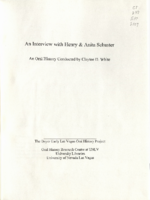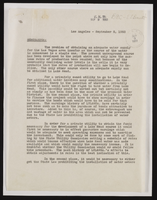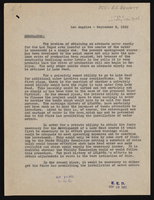Search the Special Collections and Archives Portal
Search Results

Transcript of interview with Henry and Anita Schuster by Claytee White, March-April 2011
Date
Archival Collection
Description
In this oral history, the long married couple Henry and Anita Schuster recall the history of the 1930s and how they eventually met and created a life together. Their childhoods were distinctively different, but charter a future where they would inevitably meet. Born in Germany in 1926, Henry recalls the dawn of Hitler and the Nazism. His mother would arrange for his evacuation to France, where he would not know her fate or that of his two sisters for a number of years. Along with hundreds of other displaced children, he escaped to America and lived with relatives in Louisiana where he finished his schooling and joined the US Army. Anita on the other hand grew up with her family in New York. They share the story of meeting when she was 16, falling in love and marrying in 1948. They had four children and moved several times before settling in California. They retired to Las Vegas in 1993. Henry's recollections include childhood memories of the Holocaust and its affect on his family, including the loss of his mother and one of his sisters. Finding his surviving sister Bertel (Betty Kale) after the war is a heartwarming tale of survival. The Schusters are part of the approximately 300 members of the Holocaust Survivor Group that has settled in southern Nevada and Henry was President Emeritus of the group. He published his memoir, Abraham's Son-the Making of an American, in 2010.
Text

Sook-ja Kim, February 12, 1996 and April 6, 1996: transcript
Date
Archival Collection
Description
The Kim Sisters, composed of three sisters, Sook-ja, Ai-ja, and Mia, came from Korea to Las Vegas in February 1959. Their first contract in America was to perform at the Thunderbird Hotel for four weeks as part of the China Doll Revue, the main showroom program. This engagement led to a successful career. Their popularity reached was at its height at the end of the 1960s when they performed throughout the United States and Europe. Sook-ja Kim is the oldest of the sisters. After his sister Ai-ja died in 1987, Sook-ja teamed up with her two brothers and continued to perform until 1989. Now semi-retired from show business, with occasional performances in Korea, she is working as a real estate agent. In this interview, she talked about her childhood, her career, and the family she has built since coming to America. Sook-ja was born in 1941 in Seoul, Korea as the third child of seven in a musical family. Her father was a conductor and her mother, a popular singer. After the Korean War, her mother arranged to send the Kim Sisters to America. When they came to Las Vegas, there were virtually no Koreans in the area. They depended on each other to take care of themselves. Some of the difficulties they had to adjust to in American were language, food, and cultural differences. Over the span of almost forty years in America, Sook-ja became acculturated without discarding her ethnic identity of family priorities. Her life-long guiding principle has been to adopt certain American values while continuing to keep her cherished Korean ethnic values. Through their performances, the Kim Sister informed the audience about Koreans and their culture. As the oldest of the group, Sook-ja was entrusted the care of her sisters, and later her brothers, the Kim brothers. Once she settled in Las Vegas, she brought more than forty members of her extended family to the city, contributing to the growth of the Las Vegas Korean community.
Text

James L. Hogan interview, March 11, 1978: transcript
Date
Archival Collection
Description
On March 11, 1978, collector Patty L. Baratti interviewed James Hogan (born April 6th, 1909 in Winton Place, Ohio) at his home in Las Vegas, Nevada. In this interview, Hogan talks about his time working with the telephone company in Arizona and moving to Las Vegas, Nevada. He discusses his time working on grazing rights and cattle ranching in Nevada and how planning went to ensure that farms were able to have land to graze their animals. He speaks about dealing with farmers, corporations, and the government and the frustrations he had to deal with before there were set laws about grazing. He also discusses the change from mainly family farms in Nevada to corporations owning much of the farmland.
Text
Audio clip from interview with Sonja Saltman, August 18, 2015
Date
Archival Collection
Description
In this audio clip, Sonja Saltman describes coming to the United States, and to Las Vegas, in the 1970s.
Sound

Transcript of interview with Mary Ellen Osborn Lake by Fred Wilson, February 18, 1951
Date
Archival Collection
Description
On February 18, 1951, Fred Wilson interviewed Mary Ellen Osborn Lake (born 1870 in Mercer County, Missouri) and her son, Thomas Lake (born 1889 in Missouri). Wilson first asked Mary Ellen questions about when she first arrived in Las Vegas, Nevada in 1904. Much of the relatively brief interview involved questions related to the first Methodist churches in Las Vegas and the Lakes’ involvement and recollections of the locations and members of the church community.
Text

Julie McDonald interview, March 14, 1981: transcript
Date
Archival Collection
Description
On March 14, 1981, Michael Richardson interviewed Julie McDonald (b. 1945 in Torrance, California) about her childhood and life in Las Vegas, Nevada. McDonald shares her first impressions of Las Vegas, her schooling and the location of residential areas. Throughout the interview, McDonald also goes into detail concerning her occupations at the Guild Theatre, her secretarial work at Nellis Air Force Base, her singing career and being a “21” dealer. McDonald discusses the changes in the gaming industry, particularly the incorporation of women dealers, the use of the silver dollar and the requirements for dealers. McDonald ends by discussing housing, major happenings within Las Vegas, recreation as a kid and mass media in early Las Vegas.
Text

Nanyu Tomiyasu interview, April 12, 1977: transcript
Date
Archival Collection
Description
On April 12, 1977, collector Mark French interviewed Nanyu Tomiyasu (born May 28th, 1918 in Las Vegas, Nevada) at the University of Nevada, Las Vegas. In this interview, Nanyu Tomiyasu discusses growing up and working on his father’s (Bill Yonema Tomiyasu) farm in Las Vegas, Nevada. He also discusses how his father came to Las Vegas and being one of the few Japanese families in Las Vegas as a child.
Text


